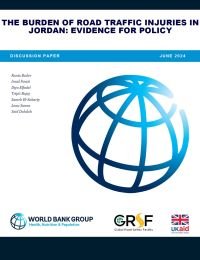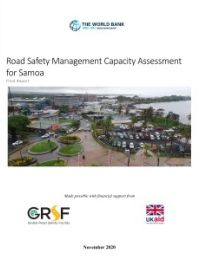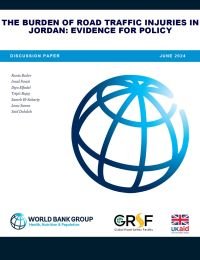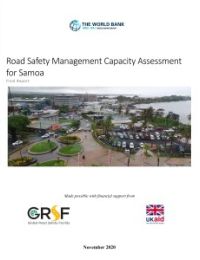Publications
1-3 of 3
-
-
- international literature and good practices on motorcycle safety;
- assessment of motorcycle crashes, regulations, risk exposure data, risk indicators in African countries (with more detailed analysis of Burkina Faso, Cameroon, Rwanda, and Uganda); and
- consultations with stakeholders.
-
-
Utilize GRSF recommended methodology to gain a thorough understanding of road safety management capacity;
-
Assess institutional management arrangements as an important focus of the analysis of the road safety system in Samoa;
-
Consider the existing national road safety strategy—Samoa National Action Plan (SNAP) for the Decade of Action for Road Safety 2011-2020—and propose updates for the next period;
-
Provide capacity building on crash investigation and evidence-based road safety measures to ensure success and sustainability, with a focus on vulnerable road users such as females, children, and persons with disabilities; and,
-
Focus on crash data management, including providing hands on capacity building and crash analysis.

Road traffic injuries (RTIs) are a critical public health issue in Jordan, as highlighted in the 2022 Annual Report of Traffic Accidents from the Jordan Public Security Directorate. With 169,409 crashes recorded in 2022, resulting in 562 deaths and 11,510 injuries, RTIs have emerged as the leading cause of death for children and young people, and the second-leading cause for adults aged 20–64.
This analytical research study aims to understand RTI-induced disabilities in Jordan, identify contributing factors, and assess the associated costs for road traffic crash victims. Using a mixed-methods approach, the research included quantitative and qualitative data collection through hospital-based surveillance and follow-up surveys at one- and three months post-injury. The study involved six public and private hospitals across Jordan. Key informant interviews with stakeholders from various sectors were conducted to gain comprehensive insights.
The study's findings reveal that most RTI patients were male (79%) with an average age of 34 years. Crashes predominantly occurred during early mornings and night hours, involving mainly cars (72%) and motorcycles/bicycles (40%). A significant number of patients (74%) received prehospital care, primarily from ambulance staff. Most patients (66%) were fully conscious upon arrival at the emergency room.
Injury analysis showed that 58% of patients had a single injury, with extremities being the most affected area. Financially, 49% of patients incurred immediate costs upon hospital admission, and follow-up care also resulted in out-of-pocket expenses, particularly for physiotherapy and medications.
The study indicated that 79% of patients experienced some disability at the one-month follow-up, with varying degrees from mild to extreme. By the third month, 73% reported no disability, though 26% continued to experience mild impairments.
This study underscores the significant burden of RTIs and associated disabilities in Jordan, highlighting the need for targeted interventions to reduce injuries and robust long-term care to support affected individuals.

In developing countries with inadequate public transport and road infrastructure, motorcycles present a fast, cheap, and efficient transport alternative. Motorcycles are widely used in many African countries for personal and public transport, as well as for service delivery. In some African countries, motorized two and three-wheelers constitute the largest proportion of the motorized vehicle population. However, despite their benefits, motorcycles expose their riders and passengers to a high risk of serious injury or death in the event of crashes. Motorcycle safety is therefore a significant problem in Africa. On average, 22.5% of road traffic deaths in 2016 involved riders/passengers of two- and three-wheelers, according to the last data published by World Health Organization (WHO, 2018).
This research study presents comprehensive strategic recommendations on how to improve motorcycle safety in Africa. The study will serve as policy advice and technical assistance to the Bank’s regional member countries (RMCs). The study focuses on motorcycle safety conditions in Cameroon, Burkina Faso, Rwanda, and Uganda, where the use of motorcycles for daily activities is reputedly high. Recommendations are predicated on an examination of the major causes of motorcycle crashes and injuries, as well as an extensive body of knowledge from various sources, notably:

The Road Safety Management Capacity Assessment (RSMCA) is an activity within a broader Advisory Services and Analytics (ASA), which aims to gain a holistic and thorough understanding of the road safety management capacity of three selected Pacific Island Countries (PICs)—Samoa, the Solomon Islands and Vanuatu—in order to support their respective governments to develop national strategies and plans of action to improve road safety outcomes, with a focus on crash data management. The ASA will also support a pilot of the World Bank’s Data for Road Incident Visualization, Evaluation, and Reporting (DRIVER) road crash database in Samoa and provide hands on capacity building in crash analysis.
The ASA is being funded by a Global Road Safety Facility (GRSF) grant from the United Kingdom Agency for International Development (UK AID). The GRSF grant will help the Government of Samoa (GoS) to have a clear image of their road safety situation, risks and challenges, and further on to establish the basis for a national crash database. To ensure sustainability through capacity building and awareness-raising activities, knowledge will be shared with local stakeholders.
The key objectives of this ASA are as follows:
An auxiliary objective is to build capacity to use crash data to identify problems and implement road safety evidence-based measures in Samoa. Furthermore, given the negative impacts of severe weather events on road safety, which will be further exacerbated by climate change, the ASA will help to address the way that road safety is managed in the face of climate change, by training police officers to gain better skills in crash investigation.
The results from the DRIVER pilot in Samoa will be shared with counterparts in selected other PICs, with the aim of scaling up the system across the region. Only with accurate data can road safety be effectively managed and improved, and results measured. In support of this, as of October 2019, the World Bank’s Environmental and Social Framework (World Bank 2019) calls for road safety to be considered on all World Bank-funded projects.
The World Bank is also currently providing assistance to the road sector in Samoa through several projects, including the Samoa Climate Resilient Transport Project (SCRTP), which commenced in 2018. SCRTP will support the GoS to improve the climate resilience of the road network and provide key assistance required to contribute towards effectively managing climate resilient and safe road sector assets. One of the sub-components of SCRTP is dedicated to establishing and operationalizing a database for recording and analyzing road crash data.
The database will combine the existing siloed data, housed in different government agencies, into a single readily accessible platform under the Ministry of Work, Transport and Infrastructure (MWTI). The system will make use of DRIVER, to be piloted through this road safety ASA. SCRTP has other sub-components and activities focused on road safety, such as Road Safety Audits for project roads, a driver licensing training pilot focusing on women, and a road safety engineering technical assistance activity. This GRSF ASA will provide crucial data and insight for the successful delivery of the road safety program under SCRTP, plus other ongoing World Bank-financed projects.



